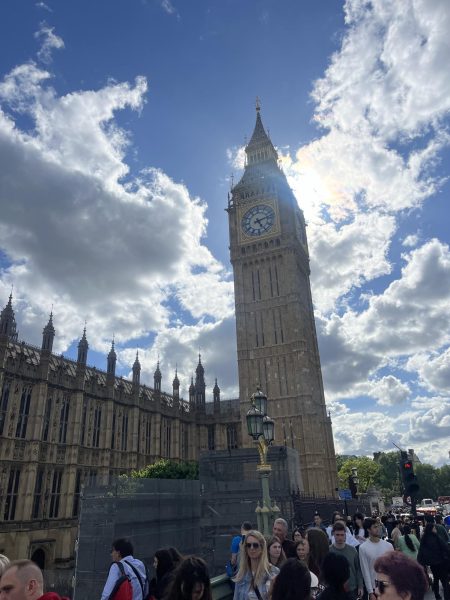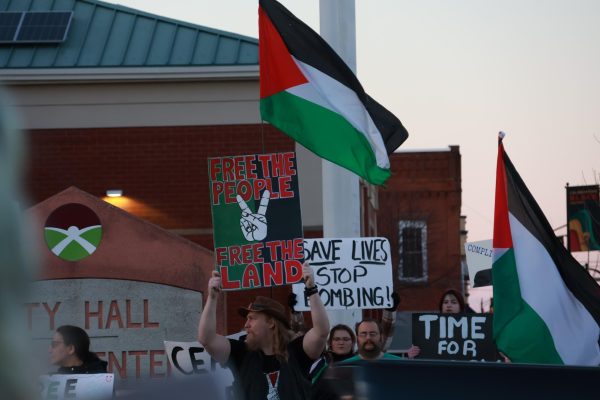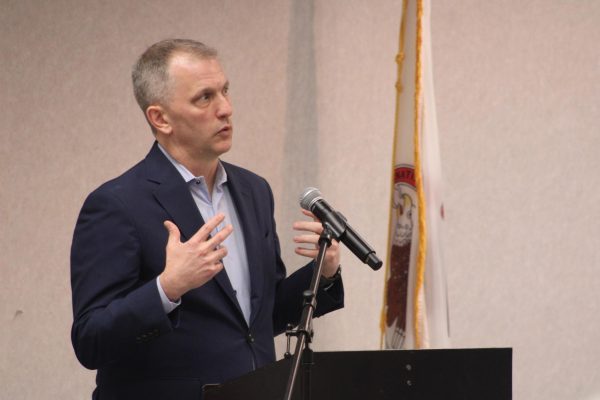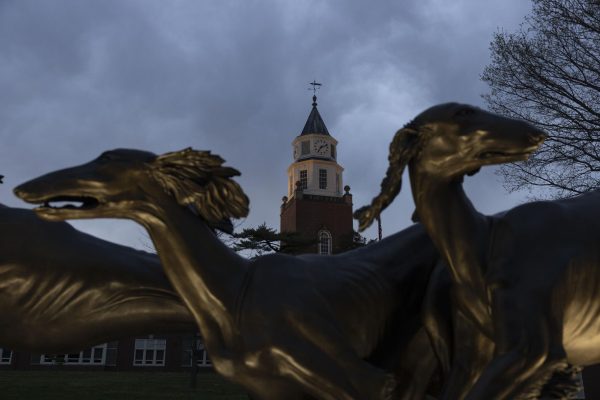Opinion: As Ukraine enters peace talks, concessions may be necessary
Vladimir Putin’s reckless, full-scale invasion of Ukraine has taken an enormous toll on both countries involved in the conflict. Destruction and misery have followed in the wake of the Russian forces as they lay siege to Ukrainian cities like Kyiv, Mariupol, and Odessa. Meanwhile, worldwide sanctions against the Russian economy have crippled its people in collective punishment, all for a deeply unpopular war waged by a ruthless autocrat.
Over the past few weeks, in the face of an enormous onslaught by the Russian military, the Ukrainians have thus far shocked the world with their resistance. Despite the Russian Armed Forces boasting an active-duty soldier count of 900,000, more than eight times that of Ukraine’s forces according to The New York Times, the Ukrainians have fought back hard, killing an estimated 7,000 to 15,000 Russian troops since their arrival.
The battle for air superiority in the skies of Ukraine has surprised many as well. Ukraine’s anti-aircraft missiles have done a tremendous job in repelling the aerial invasion from the Russian Air Force. This is especially true in Kyiv and Kharkiv, where it is said that the most anti-aircraft missiles are focused.
Advertisement
The unfortunate side effect of concentrating the anti-aircraft defenses in key locations is how it has left the rest of the country vulnerable to airstrikes. The port city of Mariupol, for example, has endured incredible levels of bombardment from Russian forces. This has created a humanitarian crisis in the city, with hundreds of thousands trapped and living on dwindling resources. Reportedly, more than 2,300 are dead.
These sorts of humanitarian crises abound. More than 3.5 million refugees have fled Ukraine since the war’s start, and those who remain are at great risk, especially in the besieged cities.
In the midst of all the damage, officials in both the Russian and Ukrainian government have laid out their demands. President Putin, in an intermediary meeting with Turkish President Recep Erdogan, again demanded official recognition of Crimea as Russian territory and the independence of the separatist regions of Donetsk and Luhansk. He has also called for the “de-Nazification” of the Ukrainian government, a long-standing pretense of the invasion, based on the relatively small presence of soldiers with far-right ideologies in Ukrainian militias like the Azov Battalion.
Meanwhile, Ukrainian President Volodymyr Zelenskyy has been ardent in expressing his desire for peace talks. While demands for territorial compromises have been soundly rejected by the president, what’s been especially interesting is Zelenskyy’s messaging regarding Ukraine and NATO. Zelenskyy has signaled several times that he would be open to negotiation with Russia on NATO membership. This is substantial, considering how back in 2019, previous president Petro Poroshenko signed an amendment to the Ukrainian constitution with the express purpose of gaining membership to NATO and the European Union.
Conceding this ground to Russian demands is certainly notable. Putin has repeatedly cited Ukraine’s inching toward NATO over the past decade or so as a foundational motivation for full-scale invasion. From the outside, it appears as if Zelenskyy has given into imperialist demands. Unfortunately, these sorts of concessions are oftentimes necessary on the long path to peace, and it may not be the last point on which Zelenskyy and his allies lose ground.
The unfortunate reality is, despite analysts’ best efforts, victory in any war is incredibly difficult to predict. The Ukrainian resistance effort has certainly shocked the world with its efficiency thus far, but the Russian forces’ sheer size may present a challenge in the long run. In any war, the ultimate victory comes from preservation of life and a resolution to conflict. Compromises are hard to come to grips with, but they’re oftentimes necessary for a greater good.
As mentioned, Zelenskyy has seemingly conceded an end to the goal of joining NATO. This was one of the demands from Putin in his address to the Turkish minister. Another of the demands he outlined was guaranteed protection for the Russian language in Ukraine. This may not be such a difficult demand to meet; simply offering the Russian language as a secondary language when speaking with Ukrainian public officials and government heads may quell this demand.
Advertisement*
Putin’s other demand, “de-nazification”, while blown well out of proportion, does stem from a legitimate concern. A few of Ukraine’s paramilitaries have in fact served as hotbeds for neo-Nazi radicalization for years. Groups like the Azov Battalion have been known to brandish Nazi insignias, parrot white supremacist ideology, and praise historical Ukrainian Nazi collaborators. These sorts of neo-fascist groups should absolutely be condemned, yet the Ukrainian government has adopted them into the Ukrainian national guard and routinely used them for operations during the war in the Donbas region leading up to the full-scale invasion.
While Russia’s repeated claims of the entire Ukrainian government being run by Nazis are clearly ludicrous, removing Nazi elements from the Ukrainian military seems a small ask for Zelenskyy and his administration.
As for Putin’s final demands involving recognition of Crimea as part of Russia, and recognition of the independence of the Donetsk and Luhansk regions – these seem like non-starters for the Ukrainian government. Despite the fierce loyalty of the Russian separatists in these regions, annexation from Russia is a breach of international law and Ukrainian sovereignty. It’s highly doubtful that the two warring countries will see eye-to-eye on this one.
The Russian invasion has gained widespread condemnation, including from local members of the Carbondale community (See more: “The ‘wired’ war: reactions from the digital front”). One can only hope that in the road to peace talks, that the two countries may find common ground in the interest of saving lives and bringing the conflict to an end.
Staff reporter Ethan Braun can be reached at ebraun@dailyegyptian.com. To stay up to date with all your Southern Illinois News follow the Daily Egyptian on Facebook and Twitter.
Advertisement












